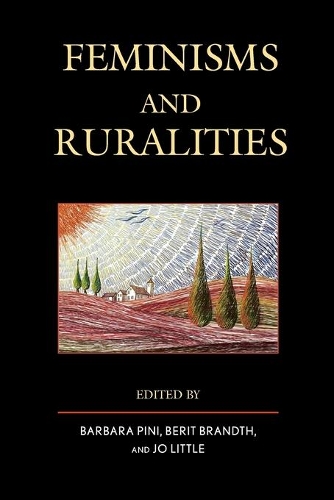
Feminisms and Ruralities
(Paperback)
Available Formats
Publishing Details
Feminisms and Ruralities
By (Author) Barbara Pini
Edited by Berit Brandth
Edited by Jo Little
Contributions by Jenny Barker Devine
Contributions by Lia Bryant
Contributions by Anne Byrne
Contributions by Kate Cairns
Contributions by Nata Duvvury
Contributions by Sara Egge
Contributions by Gro Follo
Bloomsbury Publishing PLC
Lexington Books
18th April 2016
United States
Classifications
Professional and Scholarly
Non Fiction
Population and demography
Gender studies: women and girls
305.42
Physical Properties
Paperback
250
Width 152mm, Height 229mm
Description
Feminist concern with difference has rarely extended to rurality even if it is now widely recognized that experiences of inequality depend on intersections of several identities in each individual life. This lack of concern may reflect the urban background of the majority of feminist academics or at least their urban positionality once in the academy. It may equivalently be that feminists have been influenced by stereotypes of rural women as traditional and reactionary, and thus seen them as unlikely exponents of gender equality, and an unfruitful focus for scholarly energies. Perhaps the problem is a broader one, that is, reflective of the much documented, but still apparent unwillingness of many feminists to recognize and address difference in any of its manifestations. Regardless, even with the recent interest in intersectionality which has necessarily renewed and reenergized debates in feminism about diversity and inclusion, the question of how women are differently positioned because of their non-metropolitan location has remained largely overlooked.
Reviews
Feminisms and Ruralities offers a fascinating new entry point into rural gender research by self-critically examining feminist academics recognition of, or blindness to, diversity in rural gender relations and the gains realized in the course of time. Captivating, also, is its presentation and discussion of post-feminist approaches that may enable us to come to terms with the multiplicity of the rural and the incoherent, non-linear, and contradictory development of rural gender relations. -- Bettina Bock, Wageningen University
Feminisms and Ruralities provides valuable insights into the lived feminisms of rural women and how they might speak to urban-centric feminist theory and politics. Attention is drawn to the role of feminist theories in the study of men, women, children, landscapes and animals, and to the complex braiding of feminism with other theories and practices, including queer theory, girl studies, post-humanism, and memory studies. The integration of historical and contemporary research is a particularly notable feature of this collection, which encompasses studies from locations across Europe and North and Central America. Overall, a fascinating read that posesimportantquestions of both rural and feminist studies. -- Martin Phillips, University of Leicester
It may be that in the past, feminist scholars paid little attention to gender inequality in rural areas because of presumed patriarchy and the associated masculinity of rural life. With this collected volume, which follows earlier efforts by two of the editors . . . the scholarly gap is closing . . . the overall scholarship in the contributors range of approaches and locationsissues of gender from queer theory to roles in agricultural and extractive productionis impressive. The introduction, conclusion, and 14 chapters are grouped into two sections. One is devoted to feminism and rural women, both historically and in present popular culture; the second section represents a collection of perspectives in several geographic locations. This solid contribution to the literature on women in rural areas continues the intellectual conversation about the importance of both place and gender. Summing Up: Highly recommended. Upper-division undergraduates and above. * CHOICE *
Author Bio
Barbara Pini is a professor in the School of Humanities at Griffith University. Berit Brandth is professor of sociology at the Norwegian University of Science and Technology. Jo Little is professor of geography at the University of Exeter.
